Amidst the bustling streets of Kyoto, tranquil oases await the discerning traveler. Zen gardens, meticulously crafted over centuries, evoke a sense of serene contemplation, their symbolic landscapes a testament to the harmonious balance between nature and humanity. Yet, Kyoto’s gastronomic heritage also shines, exemplified by the renowned Ichimonjiya Wasuke – a confectionary that has delighted palates since 1689. Here, visitors can indulge in the delicate aburimochi, a delectable rice cake with a charred exterior and pillowy interior, dusted with the fragrant kinako powder – a true embodiment of Japan’s enduring culinary traditions. Prepare to embark on a journey that awakens both the senses and the spirit.
Key Points
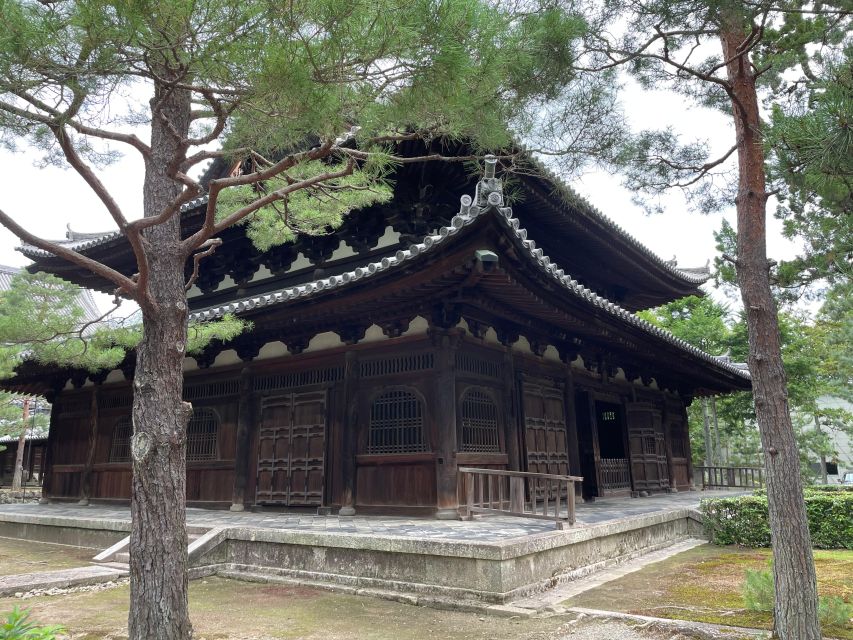
- Daitoku-ji Temple offers a tranquil oasis with centuries-old Zen gardens featuring diverse styles like dry landscape, moss, and bonsai.
- Kyoto’s historic temples showcase architectural brilliance and profound symbolism in their meticulously crafted Zen rock gardens and meditation landscapes.
- Ichimonjiya Wasuke, Kyoto’s oldest sweets shop, is renowned for its delicate aburimochi, a melt-in-your-mouth rice cake with a balanced charred exterior and soft pillowy interior.
- Imamiya-Jinja Shrine, a Shinto shrine, provides insights into Japan’s rich cultural traditions through its architectural features and the guide’s storytelling.
- Kyoto’s Zen gardens and confectionery heritage offer a feast for the senses, inspiring introspection and deeper understanding of Japanese culture.
Overview of the Tour
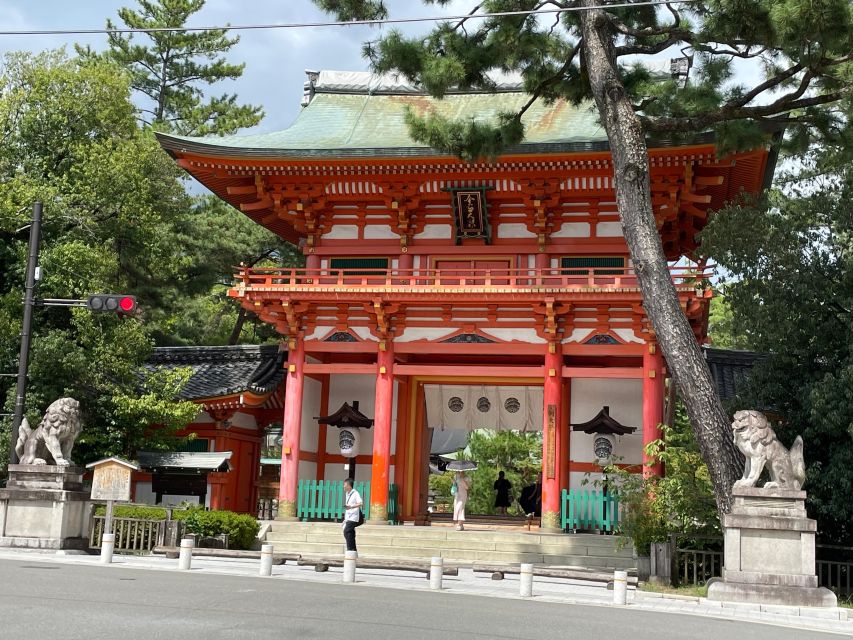
This tour offers visitors a chance to enjoy the serene zen gardens and discover the oldest sweets in Kyoto, providing a unique cultural experience lasting approximately 2.5 hours.
Led by a knowledgeable, English-speaking guide, the private group experience begins at the Kitaoji Station and takes participants on a 10-minute walk to the Daitoku-ji Temple.
Over the next 70 minutes, guests will explore the temple’s tranquil zen gardens and learn about this important spiritual site.
The tour then visits Ichimonjiya Wasuke, Kyoto’s oldest sweets shop, where travelers can sample the famous aburimochi.
You can also read our reviews of more tours and experiences in Kyoto
Exploring Daitoku-ji Temple
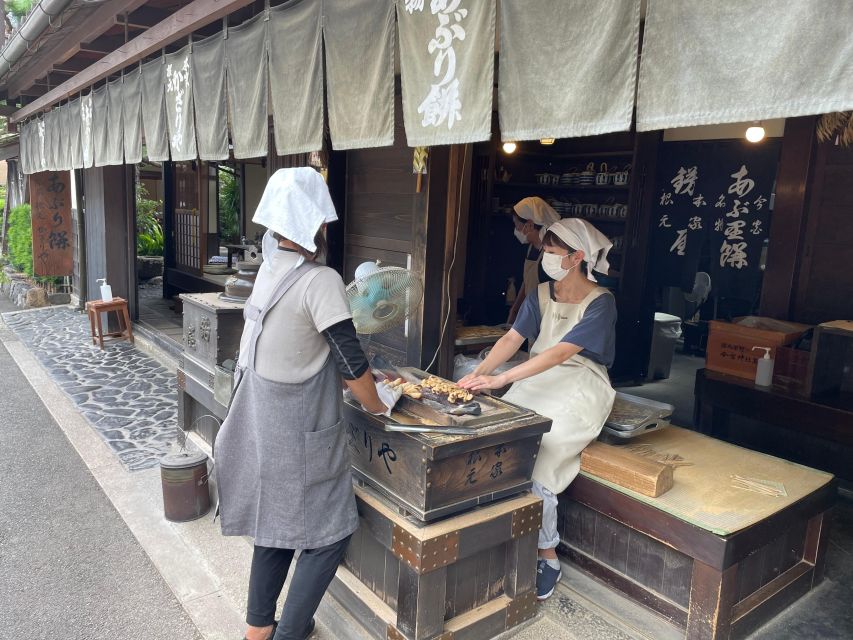
Amidst the serene surroundings of Kyoto, the Daitoku-ji Temple stands as a tranquil oasis, its centuries-old zen gardens beckoning visitors to enjoy the meditative stillness that pervades the air. As the guided tour commences, the group is led through a series of meticulously manicured gardens, each one showcasing a unique approach to the art of zen landscape design. From the mossy pathways that wind through perfectly raked gravel to the carefully pruned bonsai trees that seem to embody the essence of nature, the experience is a feast for the senses.
| Garden Type | Distinctive Features | Symbolic Meaning |
|---|---|---|
| Dry Landscape | Raked gravel, minimal vegetation | Abstraction of nature |
| Moss Garden | Lush, verdant carpets of moss | Tranquility and renewal |
| Bonsai Garden | Miniature, meticulously trimmed trees | Harmony between human and nature |
| Pond Garden | Reflecting pools, arched bridges | Symbolism of life’s cycles |
| Azalea Garden | Vibrant blooms, meandering paths | Appreciation of seasonal beauty |
Zen Temples and Gardens
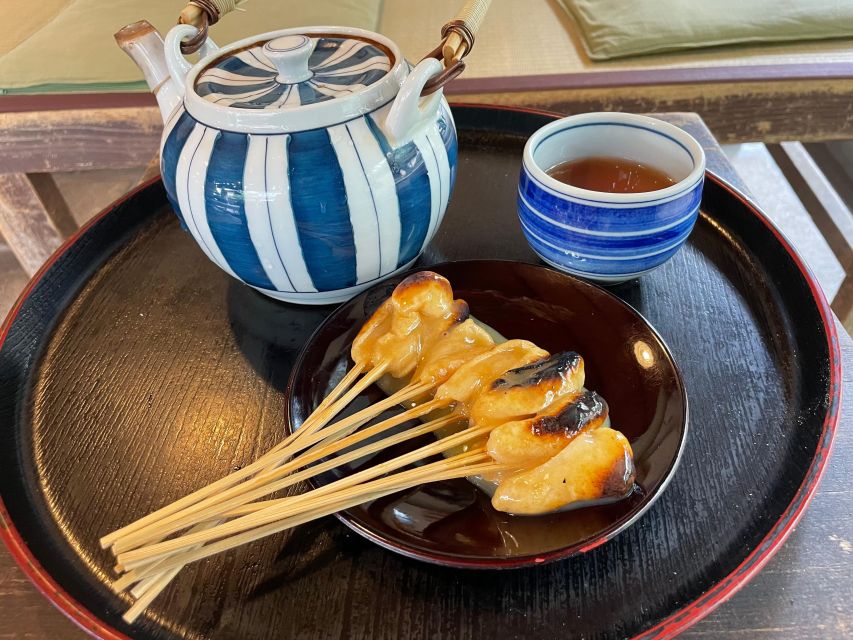
After exploring the tranquil zen gardens of Daitoku-ji Temple, the tour now ventures deeper into the heart of Kyoto’s historic temples, uncovering the profound symbolism and architectural brilliance that define these sacred spaces.
With the guidance of a knowledgeable local, the group marvels at the exquisite beauty of the zen rock gardens, where raked pebbles and strategically placed boulders create a meditative landscape that inspires introspection.
The tour also visits the serene moss gardens, where lush greenery and flowing water evoke a sense of harmony with nature.
Throughout the experience, the guide shares insights into the spiritual significance of these spaces, leaving participants with a deeper appreciation for the rich cultural heritage of Kyoto.
Visiting Ichimonjiya Wasuke
From the serene zen gardens, the tour group now makes its way to Ichimonjiya Wasuke, the oldest sweets shop in Kyoto, where they eagerly anticipate tasting the famous aburimochi.
Inside the quaint, traditional storefront, the group is greeted by the owner’s warm hospitality. They learn that Ichimonjiya Wasuke has been crafting these melt-in-your-mouth rice cakes since 1689, making it one of the oldest confectioneries in the country.
As they savor each bite, the group marvels at the delicate balance of flavors and textures. The aburimochi’s slightly charred exterior gives way to a soft, pillowy interior, perfectly complemented by a dusting of fragrant kinako powder. It’s a true taste of Japan’s rich culinary heritage.
More Great Tours NearbyGuided Tour of Shrine
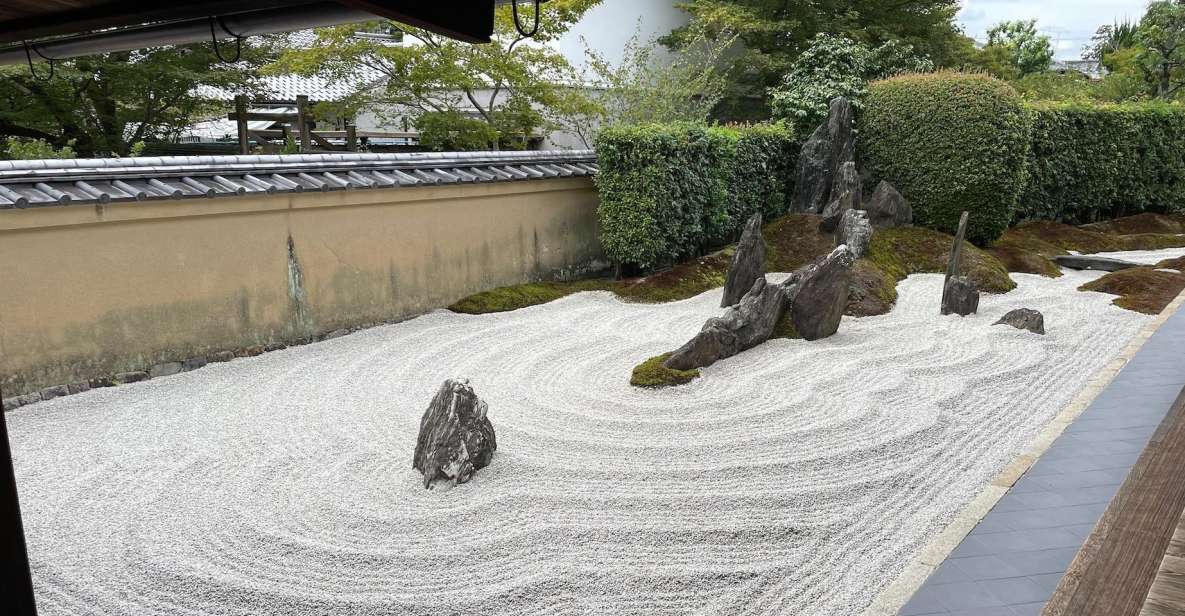
The tour group then makes its way to the Imamiya-Jinja Shrine, where the guide provides an engaging, 20-minute tour, sharing insights into the shrine’s history and cultural significance.
As they explore the tranquil grounds, the guide explains the importance of Shinto shrines in Japanese society, highlighting the shrine’s role as a place of worship and community gathering. Visitors learn about the architectural features, such as the distinctive torii gates and the use of natural elements like water and stone.
Through the guide’s captivating storytelling, the group gains a deeper appreciation for the spiritual and symbolic meaning behind the shrine’s design and customs. This final stop leaves the group with a greater understanding of Japan’s rich cultural heritage.
Highlights of the Experience
Visitors can expect to experience different types of serene zen gardens, from the meticulously raked gravel and carefully pruned bonsai trees to the natural moss-covered stone formations. At the historic Daitoku-ji Temple complex, the guided tour will showcase these varying garden styles, allowing guests to enjoy the peaceful atmosphere.
After this calming experience, the tour will then take participants to visit Ichimonjiya Wasuke, the oldest sweets shop in Kyoto. Here, they’ll have the chance to savor the famous aburimochi, a mouthwatering traditional confection that dates back centuries.
The tour culminates with a visit to the Imamiya-Jinja Shrine, where visitors can learn about the rituals and significance of Shinto shrines.
Tour Inclusions
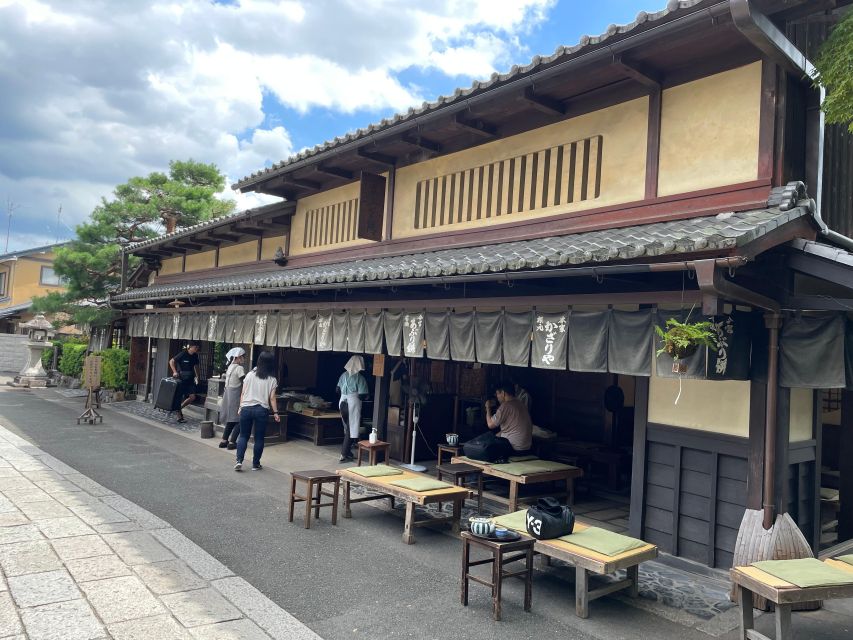
This tour includes an English translation/guide fee, covering the entrance fees for three temples up to 2,000 yen, and the cost of the famous aburimochi confection, priced at 600 yen per serving.
Guests will explore serene Zen temples and gardens, immersed in the tranquil atmosphere as the knowledgeable guide provides insightful commentary.
Visitors will then delight in tasting the oldest sweets in Japan at the renowned Ichimonjiya Wasuke shop.
The tour also includes a visit to the Imamiya-Jinja Shrine, where travelers can learn about the significance of Shinto practices.
With these comprehensive inclusions, guests can fully experience the cultural and culinary treasures of Kyoto.
Important Additional Information
Aside from the comprehensive inclusions, there are a few important considerations for guests to keep in mind when joining this tour. Firstly, it’s not recommended for those over 70 years old due to the walking involved. Travelers are also advised to obtain overseas travel insurance beforehand. And since many vendors only accept cash, it’s crucial to carry enough Japanese yen to cover any additional expenses during the experience.
| Important Considerations | Details |
|---|---|
| Age Limitation | Not suitable for those over 70 years |
| Insurance Recommendation | Obtain overseas travel insurance |
| Payment Method | Carry sufficient Japanese yen cash |
Keeping these factors in mind will help ensure a seamless and enjoyable exploration of Kyoto’s serene zen gardens and oldest sweets.
Frequently Asked Questions
Can the Tour Be Customized for Individual Preferences?
The tour can be customized to individual preferences. Guests can request adjustments to the itinerary, such as spending more time at certain sites or adding additional stops. The tour guide will work with guests to create a personalized experience.
Is There an Option to Visit More Temples and Shrines?
The tour can be customized to visit additional temples and shrines based on individual preferences. Travelers can discuss their interests with the tour guide to create a personalized experience exploring more of Kyoto’s rich cultural heritage.
What Is the Dress Code for the Tour?
The dress code for this tour is casual and comfortable. Guests should wear clothing that allows them to move freely as they explore the temples, gardens, and shrine. Comfortable walking shoes are recommended for the 10-minute walk between sites.
Can We Take Photos During the Guided Portions?
Guests are generally permitted to take photos during the guided portions of the tour, though they should be mindful of respecting the sanctity of the temples and shrines. Photography guidelines will be covered by the knowledgeable guide to ensure an enriching experience for all.
Are There Any Dietary Restrictions for the Sweets Tasting?
The tour includes a tasting of the famous aburimochi, the oldest sweets in Japan. Guests should inform the guide of any dietary restrictions or allergies prior to the tasting to ensure a safe and enjoyable experience.
Recap
Visitors to Kyoto’s Zen gardens and historic confectionery are treated to a captivating blend of tranquility and tradition.
From the serene moss gardens of Daitoku-ji to the famous aburimochi at Ichimonjiya Wasuke, this immersive experience offers a profound appreciation for Japan’s enduring cultural heritage.
It’s a journey that deeply connects one with the harmonious coexistence of nature and humanity that defines Kyoto’s timeless allure.
You can check availability for your dates here:More Dessert Tours in Kyoto
- Kyoto Sweets & Desserts Tour With a Local Foodie: Private & Custom
- Arashiyama Highlights With Making Japanese Sweets
- Kyoto Sweets and Green Tea Making and Town Walk.
- Japanese Sweets Making With Seasonal Motifs
- Japanese Traditional Sweets Making
- Kyoto WAKIMIZU Half Day Tour: Secrets of Matcha & Wagashi Sweets
More Tour Reviews in Kyoto
- Kyoto: Discover Every Bit of Ginkakuji Temple in 60 Minutes
- Private Full-Day Walking Tour of Kyoto
- Hidden Temples in Kyoto a Self-Guided Zen Tour
- 2 Hour Private Tour of Arashiyama Highlights
- Nara 9hr Tour Licensed Guide&Vehicle: Kyoto Pickup/Osaka Dropoff
- Kyoto: Half-Day Private Tour Gion Geisha Districts & Kiyomizu
Not for you? Here's more nearby things to do in Kyoto we have reviewed
- Hidden Kyoto- Countryside & Local Life – Private Car Tour
- Kyoto: Discover Every Bit of Ginkakuji Temple in 60 Minutes
- Private Full-Day Walking Tour of Kyoto
- Hidden Temples in Kyoto a Self-Guided Zen Tour
- 2 Hour Private Tour of Arashiyama Highlights
- One Way Bus From Kanazawa to Kyoto
- Nara 9hr Tour Licensed Guide&Vehicle: Kyoto Pickup/Osaka Dropoff
- Original Pizza Making Using Kyoto Vegetable at BNR Night Farm
- Kyoto 8 Hr Tour From Osaka: English Speaking Driver, No Guide
- Kyoto: Half-Day Private Tour Gion Geisha Districts & Kiyomizu
- Kyoto Sweets & Desserts Tour With a Local Foodie: Private & Custom
- Arashiyama Autumn Leaves & Sanzen-In Temple Tour From Osaka/Kyoto
